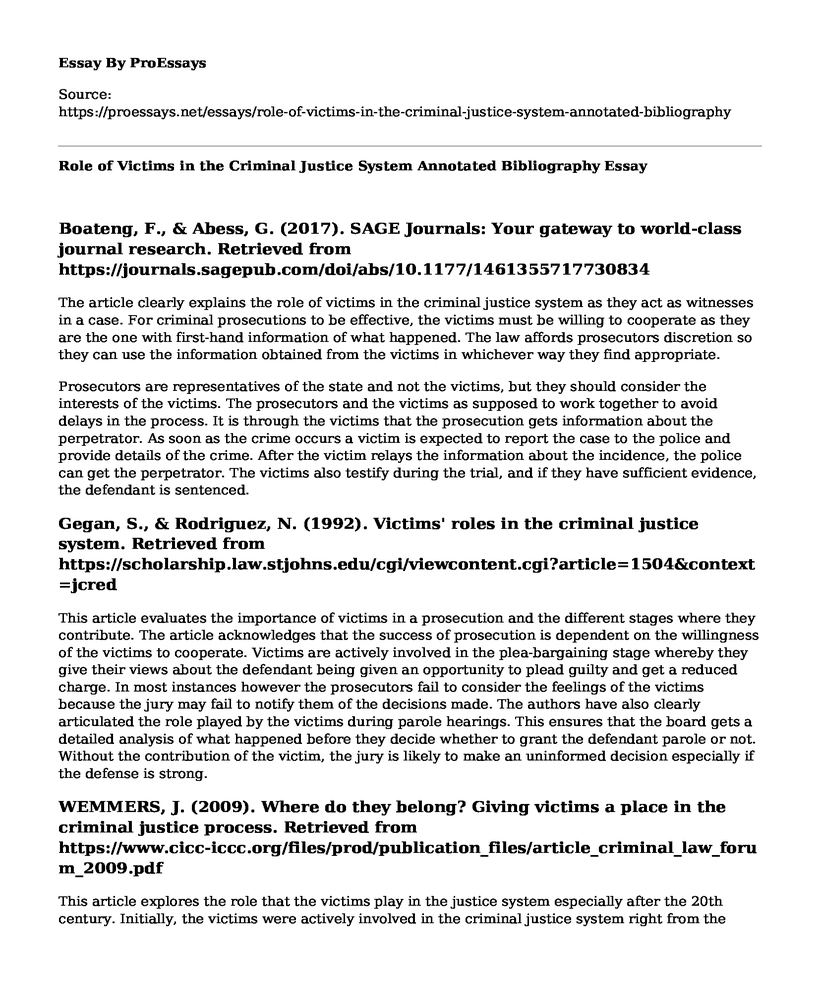Boateng, F., & Abess, G. (2017). SAGE Journals: Your gateway to world-class journal research. Retrieved from https://journals.sagepub.com/doi/abs/10.1177/1461355717730834
The article clearly explains the role of victims in the criminal justice system as they act as witnesses in a case. For criminal prosecutions to be effective, the victims must be willing to cooperate as they are the one with first-hand information of what happened. The law affords prosecutors discretion so they can use the information obtained from the victims in whichever way they find appropriate.
Prosecutors are representatives of the state and not the victims, but they should consider the interests of the victims. The prosecutors and the victims as supposed to work together to avoid delays in the process. It is through the victims that the prosecution gets information about the perpetrator. As soon as the crime occurs a victim is expected to report the case to the police and provide details of the crime. After the victim relays the information about the incidence, the police can get the perpetrator. The victims also testify during the trial, and if they have sufficient evidence, the defendant is sentenced.
Gegan, S., & Rodriguez, N. (1992). Victims' roles in the criminal justice system. Retrieved from https://scholarship.law.stjohns.edu/cgi/viewcontent.cgi?article=1504&context=jcred
This article evaluates the importance of victims in a prosecution and the different stages where they contribute. The article acknowledges that the success of prosecution is dependent on the willingness of the victims to cooperate. Victims are actively involved in the plea-bargaining stage whereby they give their views about the defendant being given an opportunity to plead guilty and get a reduced charge. In most instances however the prosecutors fail to consider the feelings of the victims because the jury may fail to notify them of the decisions made. The authors have also clearly articulated the role played by the victims during parole hearings. This ensures that the board gets a detailed analysis of what happened before they decide whether to grant the defendant parole or not. Without the contribution of the victim, the jury is likely to make an uninformed decision especially if the defense is strong.
WEMMERS, J. (2009). Where do they belong? Giving victims a place in the criminal justice process. Retrieved from https://www.cicc-iccc.org/files/prod/publication_files/article_criminal_law_forum_2009.pdf
This article explores the role that the victims play in the justice system especially after the 20th century. Initially, the victims were actively involved in the criminal justice system right from the initial stage of reporting to the police to the final stage of prosecuting the offenders. The author believes that from the 20th century up to date the victims only participated only as witnesses. In any case, presented in the court the victim acts as the primary witness right from reporting to the police as well as in the chamber. The author believes that the right to participate in the entire criminal justice process was not impaired by the defendant but by the states. This is because instead of compensating the victims the states were/are the ones who are compensated through fines. This makes the victim feel left out and discriminated by the same law that is supposed to protect him or her.
Doak, J. (2005). Victims' rights in criminal trials: prospects for participation. Journal of Law and Society, 32(2), 294-316.
The article evaluates the role played by victims in the criminal justice system and the need for their protection. The authors have also evaluated the history of the program that helps the witnesses to report the crimes to the authorities and cooperate during the investigation. In 1980, intergovernmental organizations encouraged the establishment of victims' movements that could ensure that they received justice. During this time the government realized the importance of empowering the victims of crime and ensuring that their safety was guaranteed. This is because they play a crucial role in the prosecution process which is acting as witnesses. The authors acknowledge in the article that without victim' cooperation it would be difficult to prosecute an offender. Even before the defendant is aligned in court, the victim reports the incidence and gives details that help in the identification of the offender and his/her subsequent arrest.
Cite this page
Role of Victims in the Criminal Justice System Annotated Bibliography. (2022, Dec 06). Retrieved from https://proessays.net/essays/role-of-victims-in-the-criminal-justice-system-annotated-bibliography
If you are the original author of this essay and no longer wish to have it published on the ProEssays website, please click below to request its removal:
- Historical Development of Capital Punishment and Religion Essay
- Essay Sample on Restorative Justice
- Copyright and Intellectual Property Paper Example
- Good Leadership, Criminal Justice & Social Contract Theory - Essay Sample
- Essay Example on a Look Into Surveillance: Ancient to Modern Monitoring Techniques
- Essay Example on Sleep Studies in Lab Setting: Problems & Solutions
- Elderly Targeted by Identity Theft - Free Essay Example







